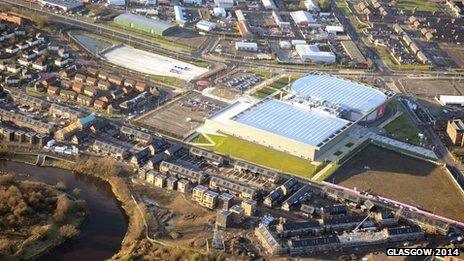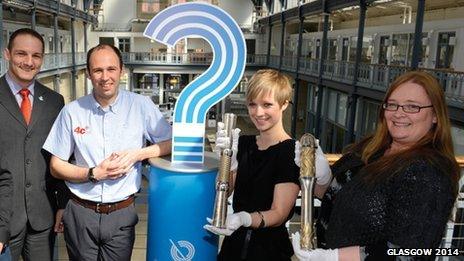Mixed findings in Glasgow 2014 Commonwealth survey
- Published

Residents in the east end were asked about the impact of the games
The first survey to track the impact of the Commonwealth Games in Glasgow has found strong local support but concerns about litter, street safety and low-levels of physical activity.
Academics from Glasgow University spoke to 1,015 householders.
Their survey findings will form the baseline of a five-year study to measure the success of games.
Meanwhile, it has been announced that the Queen's Baton for the games will be created by Glasgow firm 4c Design Ltd.
The study to evaluate the Scottish government's Legacy 2014 programme covered Parkhead, Bridgeton, Calton, Camlachie, Dalmarnock and Gallowgate.
The survey found that 81% of respondents believed the 2014 games would have a positive impact in their local area.
Ongoing regeneration
Some 76% expressed support or strong support for the event, while 44% of residents said their neighbourhood had improved in the last three years.
Just over one third of respondents - 37% - said they agreed that they had influence in decisions made about their local area.
The survey also highlighted areas for improvements as the ongoing regeneration programme gathers pace ahead of the games.
Some 75% said they thought their local environment was untidy, suffering problems of rubbish and litter.
Just over half - 52% - said they felt safe outdoors at night, compared to a Glasgow-wide figure of 61% and a Scotland-wide figure of 68%.
The survey also found that some 37.5% of respondents had low levels of physical activity.
It stated that "this compares relatively poorly to statistics from the Scottish Health Survey" which showed that the figure was only 32% for Scotland and the Greater Glasgow and Clyde health board area.
The study was carried out by principal investigator Professor Ade Kearns and Dr Julie Clark, both from Glasgow University.
Prof Kearns said: "The survey findings show that parts of the east end of Glasgow are already changing as a result of developments over the past few years, and that residents are aware of these improvements.
"But the results also show the need, and indeed the scope, for further action to achieve the legacy aims identified for the Commonwealth Games, for example around physical activity and neighbourhood quality.
"This initial survey is an important baseline for measuring change over time and the effects of regeneration and legacy programmes."
'Dramatic change'
Sport Minister Shona Robison said preparations for the games were bringing about a massive change for the better in the east end of Glasgow.

4c Design Limited has been chosen to design the Queen's Baton
"With the new Emirates stadium in place, the transformation of Bridgeton Cross, the creation of the athletes village and the Tollcross swimming pool being upgraded to a world-class standard, the investment to date has seen a dramatic change in the local landscape," she said.
"As part of our firm commitment to delivering a lasting legacy from the games, it's vital we undertake robust evaluation in the run up to 2014 and beyond to understand how the games are impacting on the lives and health of our communities.
"These study results provide us with a clear picture of the views and opinions of the people living at the heart of the games action, one we believe we can build on as games time draws nearer."
The study was commissioned by the Scottish government, NHS Health Scotland and sportscotland.
Queen's Baton
Meanwhile, it was confirmed on Tuesday that a Glasgow firm is to create the Queen's Baton for the 2014 games.
The 2kg baton, which will be taken on a relay to 71 competing Commonwealth nations and territories in the 10-month build-up to the games is to be designed, engineered and manufactured by 4c Design Limited.
Glasgow 2014's baton will be the first to visit Rwanda as the relay covers 118,060 miles over 288 days.
In creating the baton William Mitchell, 4c Design's owner and director, believes his team is involved in "potentially the most exciting design brief of the decade".
Challenges include creating a baton that can withstand all weathers and different types of transport as it crosses the globe.
The journey begins at Buckingham Palace on 9 October when the Queen places her message to the Commonwealth.
From there, the baton will travel to Glasgow and overseas.
- Published23 May 2013
- Published16 May 2013
- Published13 May 2013
- Published30 April 2013